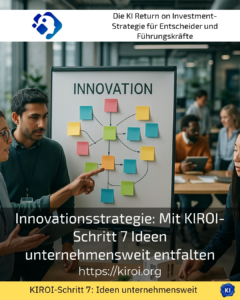Knowledge exchange as a driver for sustainable success
Sharing knowledge is a challenge in many companies because it involves far more than just the pure transfer of data. It is crucial to create a culture in which employees are motivated to actively share their knowledge and develop it further together. The focus is on how knowledge can be integrated sustainably and flexibly into everyday working life so that organisations can react dynamically to new requirements.
Accompaniment as a key role in knowledge exchange
Managers often approach consultants with questions about the implementation of knowledge sharing, but do not want ready-made solutions. Instead, they benefit from support that provides impetus and creates spaces in which customised and tailor-made methods can be developed. This approach promotes the independent development of structures that remain effective in the long term and can be flexibly adapted to new organisational realities.
Making targeted use of the variety of knowledge exchange methods
There are numerous approaches for promoting the exchange of knowledge. These include traditional mentoring programmes, digital platforms, webinars and hybrid learning formats that combine face-to-face and online components. The trick is to adapt these methods to the specific needs and possibilities of the company and thus establish a living learning culture.
In the field of technology, formal and informal meetings are often combined so that specialised knowledge can be exchanged in an uncomplicated manner. This strengthens collaboration and collegial support, especially in complex projects. In the service sector, hybrid formats are popular because they cater for different learning styles and schedules, making knowledge sharing more accessible for all participants. Production companies focus on organising information flows in such a way that important knowledge is quickly accessible and can be applied in practice.
Practical examples for the promotion of knowledge exchange
KIROI BEST PRACTICE at company XYZ (name changed due to NDA contract) Coaching created an environment in which employees could share their expertise in various formats. The introduction of informal meetings and digital exchange platforms not only improved networking, but also significantly increased collegial support for complex technical projects. This led to increased flexibility and efficiency.
KIROI BEST PRACTICE at ABC (name changed due to NDA contract) In a service company, a hybrid learning system that combined classroom training with online webinars was set up with targeted support. This significantly changed the learning culture, knowledge sharing became a natural part of everyday working life and employees felt more motivated to share their expertise across departmental boundaries.
KIROI BEST PRACTICE at DEF (name changed due to NDA contract) In a production environment, the focus was on improving information flows. Systematic support enabled work processes to be organised in such a way that the required knowledge is available more quickly. Since then, employees have been using digital tools and regular short formats for dialogue, which makes everyday operations much easier and reduces errors.
Rethinking the exchange of knowledge: focussing on culture and communication
Knowledge sharing is often confused with technical solutions. In fact, the focus is on creating an open culture and open communication. Decision-makers often report that the biggest challenge is to create a space in which experiences can be shared without fear and new ideas can be tried out. Collegial support, trust and the active promotion of learning processes are essential cornerstones.
This is where coaching comes in: It is about stimuli that encourage reflection and help to rethink familiar patterns. The aim is not to prescribe a one-size-fits-all solution, but rather to discover individualised paths that fit into the respective company reality and are supported by the employees. This creates a lively exchange of knowledge that continues to develop flexibly.
My analysis
Knowledge sharing is more than just a technical challenge - it is a cultural and communicative process that has a significant impact on collaboration in companies. Accompanying support is useful because it strengthens managers in developing their own customised methods and integrating them into everyday life. A supportive environment and a diverse selection of methods are essential for this.
The services offered by companies such as KIROI Coaching do not provide solutions, but accompany projects in order to provide concrete impetus and insights. In this way, knowledge sharing becomes an integral part of collaboration, making organisations agile and resilient in a complex and fast-moving world.
Further links from the text above:
[1] KIROI Step 1: Knowledge sharing as a success factor for leaders
[3] Rethinking knowledge transfer: Step 1 to success with KIROI
For more information and if you have any questions, please contact Contact us on the topic or read more blog posts on the topic Artificial Intelligence Blog here.














